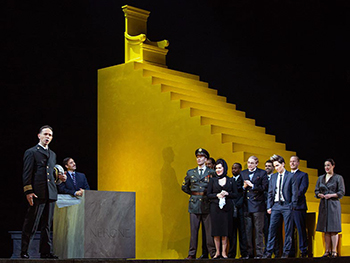A reflection on the Metropolitan Opera's astounding production of Handel's early opera Agrippina, which we saw in an utterly compelling live cinema relay.

I’ve remarked before that one of the upsides of our move to the south coast is being closer to a great range of entertainment facilities which we’ve been taking full advantage of… at least until now.
One of the most memorable to date was also perhaps one of the least expected. It was the live cinema relay from the stage of the Metropolitan Opera in New York of Handel’s opera Agrippina, which took place at the end of February. It was unexpected in that Handel operas – though often packed with great tunes – can be a little staid and repetitive – conceived in a different time for a different audience unused to the pace of modern drama or movies.
What made this one different, though, was the speed and pace of the production, which brought the opera up to date in an extremely powerful way. Agrippina was famously the murderous power-hungry wife of the Roman Emperor Claudius, who married the emperor primarily to ensure that her son Nero from a previous marriage could succeed his stepfather. The opera is fundamentally about her search for power and her willingness to manipulate those around her, including her son, his rivals for the throne and the beautiful young widow Poppea.
These themes are universal, and this enables to be piece to be set in modern times equally well. The Met’s production is directed by former ENO chief Sir David McVicar, who originally created this version for Théâtre Royal de la Monnaie in Brussels. He has modernised Handel operas before, most notably in Glyndebourne’s acclaimed 2005 production of his later opera Julius Caesar.
Aside from the production, what made the evening so memorable was the quality of both the acting and the singing from a stellar cast led by mezzo soprano Joyce DiDonato as the controlling, power-hungry Agrippina. She was joined by mezzo-soprano Kate Lindsey in a trouser role as Agrippina’s son and future emperor Nerone: she played him as a teenage brat, full of contradictions and signposts of things to come in his later life. Soprano Brenda Rae was a terrifically seductive Poppea, whilst countertenor Iestyn Davies excelled as her suitor, the ambitious officer Ottone. Bass Matthew Rose played the weary emperor Claudius.
This was opera at its finest – compelling, dizzying in its beauty and intensity and at times tear-inducing at the sheer brilliance of the spectacle unfolding before you. The extended scene after the interval, which takes place in a downtown bar will, in particular, stand out in my memory. And, of course, all brought to us live from the stage of the opera house in New York in High Definition format – another miracle of technology. Spellbinding.




